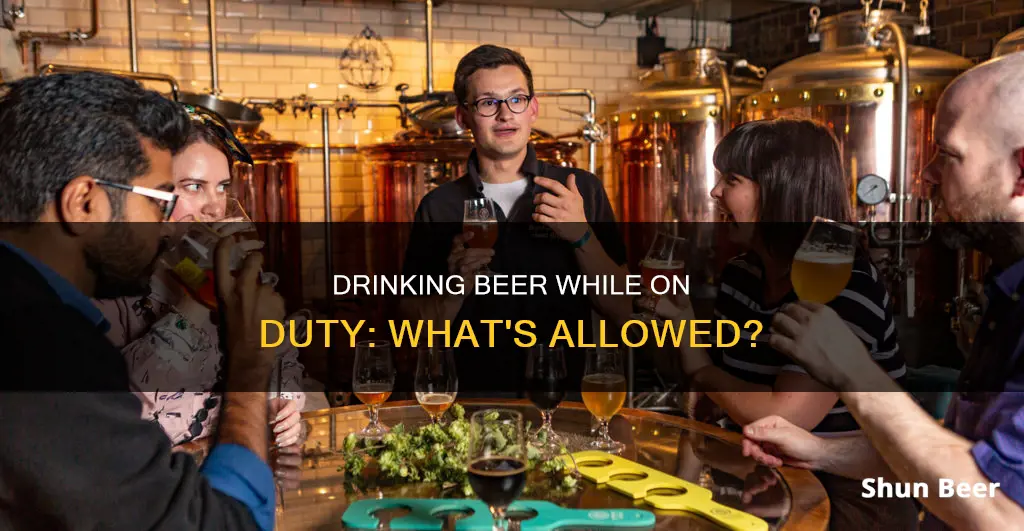
Drinking on the job is a controversial topic, and the rules surrounding it vary depending on the industry and role. In the military, for example, there is no explicit regulation prohibiting drinking during duty hours, but being drunk on duty is illegal. Each soldier is responsible for understanding how alcohol affects them, and showing up to duty sober. In the Air Force, some career fields have a zero-tolerance policy, while others allow drinking during lunch or after official duty is done. In the army, some installations address alcohol consumption in their policies, while others do not. For instance, Ft Carson CG Policy 03 prohibits soldiers on duty from consuming alcohol during duty hours, which are established by the unit and/or duties performed.
What You'll Learn

Drinking a beer while on military duty
Drinking alcohol while on military duty is prohibited. Each installation has an alcohol policy, and some specifically address the issue of consumption during duty hours. For example, Ft Carson CG Policy 03 covers alcohol and states that soldiers on duty cannot drink alcohol during duty hours, deployment, or training. This means that a soldier performing 24-hour CQ is on duty for the entire 24 hours and cannot drink beer with dinner. General Order #1 in Iraq and Afghanistan also prohibits the consumption and possession of alcohol at all times.
While the military discourages drinking, responsible alcohol consumption is permitted. However, many service members exceed healthy limits and develop a dependency. The rates of heavy alcohol use are significantly higher among 18- to 25-year-olds in the military than in the same age group of civilians. The Marine Corps has the highest rate of heavy alcohol use, with 38.6% of young men and 12.9% of young women admitting to drinking heavily.
The Uniform Code of Military Justice (UCMJ) sets guidelines and punishable consequences for alcohol-related offenses, including drunkenness, disorderly conduct, drunken or reckless operation of a vehicle, and being drunk on duty. Disciplinary actions for these offenses can include confinement, forfeiture of pay, dishonorable discharge, and bad-conduct discharge.
The minimum drinking age on military installations follows the law of the state in which the installation is located. Service members must be at least 21 years old to buy or drink alcohol in the U.S., but there may be exceptions when serving abroad. The CDC sets guidelines for moderate alcohol intake, defining one drink as a 12-oz beer, with moderate drinking defined as one drink or less per day for women and two drinks or less per day for men. A BAC of 0.06% can impair cognitive performance, and a BAC of 0.08% is considered legal intoxication in most states. Military installations may adopt a higher BAC limit of 0.1%.
Beer and MRI: What You Need to Know
You may want to see also

Drinking in uniform
In the United States, each military installation has its own alcohol policy, and some specifically address the issue of consumption in uniform. For example, Ft Carson CG Policy 03 prohibits soldiers on duty from consuming alcohol during duty hours, which are established by the unit and/or the duties being performed. This means that a soldier on a 24-hour duty is prohibited from drinking alcohol with dinner. Additionally, alcohol is prohibited during deployment or training, even during off-duty hours when a soldier returns to their residence.
Similar discussions among members of the US Air Force and National Guard reveal varying opinions and experiences. Some individuals recall drinking in uniform at bars or restaurants, while others suggest that it is generally frowned upon and may attract negative attention from civilians. There is a consensus that drinking in a dress uniform is more acceptable than in a duty uniform, and that it is important to avoid intoxication and drunk driving.
Overall, while there may be no specific regulation prohibiting drinking in uniform, it is important for military personnel to exercise good judgement and follow any relevant policies or guidelines set by their respective installations or units.
Beer and Vicodin: Risky Mix?
You may want to see also

Drinking during duty hours
Drinking on the job is a serious issue, especially in hospitality, where employees may argue that they consume alcohol to stay awake during long shifts, cope with stress, or appease customers. Drinking on the job poses a great danger to employees, their colleagues, and customers. It is the employer's legal duty to ensure the health, safety, and welfare of their employees. If an employee drives or uses knives or sharp utensils as part of their role, there are high risks of workplace accidents, especially if the employee is drinking.
In the US military, every installation has an alcohol policy. For example, Ft Carson CG Policy 03 covers alcohol and states that there should be no alcohol consumption during duty hours by soldiers on duty. The duty day is not standard times but is established by the unit and/or duties being performed by the soldier. This means a soldier performing 24-hour CQ is on duty for the entire 24 hours and cannot drink beer with dinner.
General Order #1 in Iraq and Afghanistan prohibits the consumption and possession of alcohol at all times. While there is no specific regulation prohibiting drinking during duty hours in the US Air Force, drunkenness on duty is illegal. The Manual for Courts-Martial defines "drunk" as:
> "the state of intoxication by alcohol that is sufficient to impair the rational and full exercise of mental or physical faculties; or the state of meeting or exceeding a blood alcohol content limit of 0.08 grams of alcohol per 100 milliliters of blood or 0.08 grams of alcohol per 210 liters of breath."
Some functions in the Air Force prohibit alcohol within a certain number of hours of duty. For example, air traffic controllers must not drink within 12 hours before their shift.
Does Helium Beer Work? The Science Behind It
You may want to see also

Drinking on base
However, the rules can vary depending on the branch of the military and the location of the base. For example, the Marine Corps has stricter rules, with a limit of one alcoholic beverage for on-duty drinking. Breathalyzer tests can be administered at random, and a result of 0.01% would lead to counseling for the soldier. Other branches of the military, such as the Navy, Air Force, and Army, do not allow an alcohol reading of 0.05, and failure to stay within these limits can lead to a dishonorable discharge.
Additionally, there may be specific policies or regulations that prohibit drinking in certain situations, such as during duty hours or while in uniform. For instance, Ft Carson CG Policy 03 covers alcohol consumption during duty hours and deployment or training.
It's important to note that the rules regarding drinking on base are subject to change and may vary depending on the specific circumstances and location. Commanders of US military bases located in other countries have the power to uphold American drinking laws or obey the host country's alcohol regulations.
Digital Beer Rebates: How Do They Work?
You may want to see also

Drinking while driving
In the United States, drinking and driving is considered a crime and can result in strict punishments. The legal blood alcohol content (BAC) limit for driving is 0.08%, and driving with a higher BAC is illegal in all states. However, even a small amount of alcohol can have harmful effects, and some individuals may not show signs of intoxication but still pose a danger on the road.
The dangers of drinking and driving are evident in the statistics. In 2020, 11,654 people in the United States lost their lives in crashes involving alcohol-impaired drivers. This accounts for nearly one-third of all traffic-related deaths. The economic impact of these crashes is also significant, costing the country approximately $44 billion annually.
To reduce the risks associated with drinking and driving, it is recommended to refrain from consuming any alcohol before getting behind the wheel. There are also legal consequences for drinking and driving, which can include fines, jail time, community service, and the requirement to undergo alcoholism treatment. Additionally, a conviction can have negative impacts on personal and professional life, affecting relationships, employment opportunities, and insurance rates.
While the laws and regulations regarding drinking and driving vary across different states and countries, the message is clear: drinking and driving is a dangerous and irresponsible act that can lead to devastating consequences. It is essential to prioritize safety and make alternative arrangements when consuming alcohol, such as designating a sober driver or using public transportation. By making responsible choices, individuals can help ensure their own safety and the safety of others on the road.
Beer and Medication: Safe or Not?
You may want to see also
Frequently asked questions
No. For example, Ft Carson CG Policy 03 covers alcohol and states that soldiers on duty cannot consume alcohol during duty hours. The duty day is not standard times but is established by the unit and/or duties being performed by the soldier.
It depends on the installation and its alcohol policy. For example, Ft Carson CG Policy 03 does not address drinking in uniform but does address no alcohol consumption during duty hours. Other installations may have policies prohibiting alcohol consumption in uniform at any time.
Soldiers are not allowed to wear combat uniforms in off-base establishments that primarily sell alcohol for consumption on the premises. If the establishment sells alcohol and food, soldiers may not wear utility uniforms if their activities in the establishment center on drinking alcohol only.







